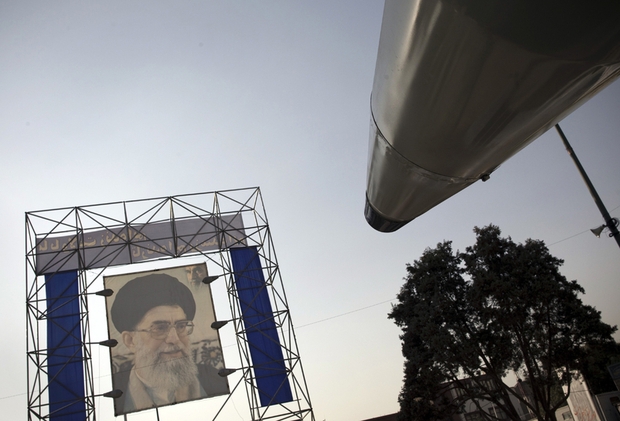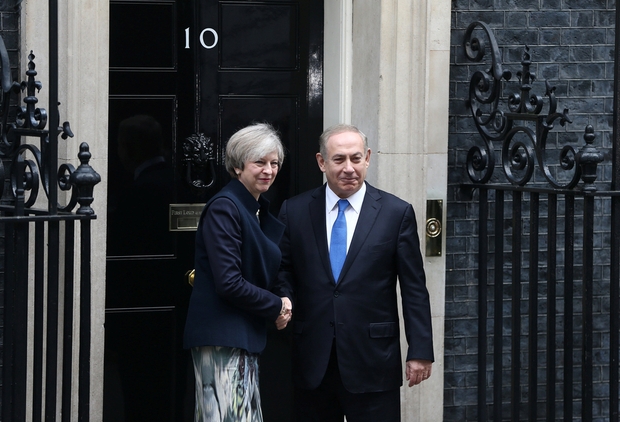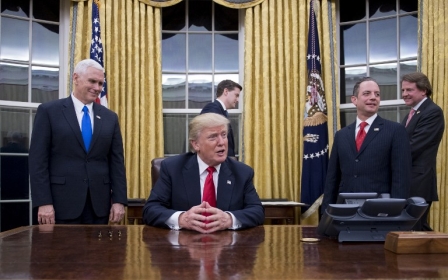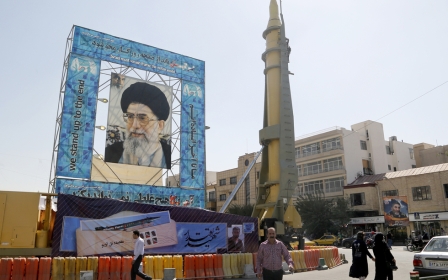Trump, Israel and Iran: A lot of noise and threats, but no war
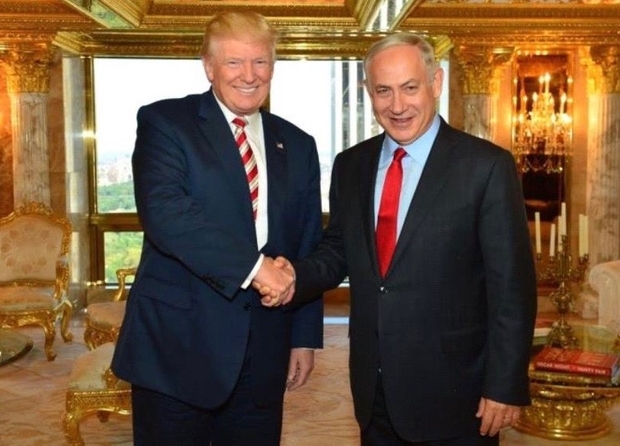
Despite the inflammatory rhetoric coming out from the Trump presidency, war with Iran is not on the horizon.
Last week, Iran tested two long-distance missiles. One, with a range of 3,500- 4,000 kilometres, is capable of reaching Europe. The other was a ballistic missile with a 2,000 kilometre range. Reports suggested that at least one test - probably two - failed or had problems.
In response to the tests, the US national security adviser, the hawkish extreme right-wing Lt Gen (retired) Michael Flynn declared in his first press conference that the administration is “officially putting Iran on notice”.
By testing the missiles, Iran is not breaching the nuclear deal it signed with the six world powers in July 2015
In addition to the missile test, Flynn also referred to news of an attack on a Saudi Al-Madinah warship by Iranian-backed Houthi rebels in Yemen. A Houthi explosive-laden suicide boat rammed into the Saudi frigate, killing two Saudi sailors.
President Donald Trump was in his element. He tweeted a warning to Iran saying it was “playing with fire” and ordered the Norfolk based USS Cole – the same guided missile destroyer that al-Qaeda targeted in the port of Aden in 2000, killing 17 US sailors - to change its voyage and redirect it to patrol the Red Sea waters near the Yemeni coast.
Trump also ordered his treasury to add a few individuals from the Iranian Revolutionary Guards Corp (IRGC) and entities linked to the missile programme to the US sanction regime.
UN violations
By testing the missiles, Iran is not breaching the nuclear deal it signed with the six world powers in July 2015. But it may have been in violation of UN Security Council decisions.
For example, UN Resolution 2231 from 2015 “calls upon Iran not to undertake any activity related to ballistic missiles designed to be capable of delivering nuclear weapons, including launches using such ballistic missile technology”.
Iran’s counter argument is that since it has no intention of developing nuclear weapons, its missile programme is not and cannot be related to its nuclear programme.
Pushing the envelope and conducting a “threshold policy” is a typical Iranian policy ploy, used numerous times against the world powers during the nuclear negotiations. Media commentators and public figures identified with the ultra-conservative circles responded with fiery language bashing the US.
But Foreign Minister Javad Zarif’s counter tweet was mild. He wrote that the tests were legitimate and that Iran has no aggressive intentions, but will defend itself if attacked. More interesting is the silence of the Supreme Leader Ali Khamenei. He said nothing, which is very unusual under such circumstances.
'Official notice'
The big questions are what are the Trump administration’s options and what does it intend to do next. First of all, what does it means to put a country on an “official notice”. Flynn did not elaborate, leaving his words enigmatically to hang in the air.
Senior US officials and Vice President Mike Pence later added another layer of vagueness, saying there are several options available to the administration, hinting “that we’re going to take appropriate action”.
Former CIA and NSA director Michael Hayden thinks the real intention of Netanyahu-Barak was to provoke Iran to attack Israel and thus to drag the US into an all-out war
Before the nuclear deal, the mantra repeatedly used by the Obama administration and Netanyahu’s government was that “all options are on the table,” referring to a military attack against the Islamic republic. While Obama just wanted Iran to cave in and limit its nuclear programme, Netanyahu planned to drag the US into a military action against Iran.
In 2012, the Israeli prime minister and his then defence minister Ehud Barak instructed the army, especially the air force and the intelligence community, to prepare attack scenarios against Iran.
During the Obama administration, the Israeli intelligence and military chiefs, such as the late Mossad head Meir Dagan, opposed the war mongering of Netanyahu and Barak. Why, their thinking went, should Israel use the last possible resort when other options – sanctions, sabotage, Stuxnet, for example - were still possible? And eventually, the war option came off the table.
Limited options
Now the Trump administration is bringing the military option back into the open – or so it seems. It is not a secret that Trump and his team dislike the nuclear agreement they inherited from the Obama administration.
In contrast to the estimates of the US and Israeli intelligence communities about the nuclear deal – “It’s not a bad deal” – the Trump team, like Netanyahu, views it as a disaster. But it seems that Trump’s hands are tied. The deal is not a bilateral US-Iranian one. It’s a multilateral agreement approved by the UN Security Council and supported by the entire international community.
Once the nuclear deal became a reality, Netanyahu's motivation to attack Iran - or to pretend that he was willing to - went out the window
Netanyahu, who met British Prime Minister Theresa May this week in London, is due to see Trump next week in Washington. He will try to persuade him to be tough on Iran. So hope the pro-western Sunni states such as Saudi Arabia, Bahrain and the UAE.
But Netanyahu is no longer talking about a military strike, whether Israel or American. Disaster or not, once the nuclear deal became a reality, his motivation to attack Iran - or to pretend that he was actually willing to attack - went out the window. Now he just hopes that Trump will continue to pile on the pressure.
The US could unilaterally pull out of the agreement but the other signatory members – Russia, China, the UK, France and Germany - would most likely still honour it. If the US pulls out, it will jeopardise its already strained relations with China and put Washington on a collision course with Moscow.
Moscow factor
Such a step would make Trump’s attempts to reach a new world order with President Vladimir Putin much more difficult. By the way, Russia says that Iran didn’t violate any agreement by conducting the ballistic missile test.
All the steps taking so far by the Trump administration, including the sanctions, are minor. In order to inject credibility to its threats and to be taken seriously by Tehran, the Trump administration will need to be more creative in its wording and more serious in its actions. Still, it’s not clear what Trump is up to.
Tension and escalation may give the relatively moderate President Hassan Rouhani his second term
Trump and some of his aides (Steve Bannon) are seeking to escalate the tension with Iran. They want to provoke Iran to give them the pretext to walk out of the nuclear deal and even more so to attack Iran. So far Iran’s restrained reaction shows it doesn’t swallow the bait.
But tension and escalation may give the relatively moderate President Hassan Rouhani his second term. The presidential election’s first round is in May and Rouhani hasn’t yet declared that he would be running for reelection.
In the era of President Donald J Trump, no statement, or even action, can surprise. If he attacks Iran he may declare it on Twitter.
- Yossi Melman is an Israeli security and intelligence commentator and co-author of Spies Against Armageddon.
The views expressed in this article belong to the author and do not necessarily reflect the editorial policy of Middle East Eye.
Photo: Trump and Netanyahu met at Trump Tower during the presidential campaign last year (Screengrab)
New MEE newsletter: Jerusalem Dispatch
Sign up to get the latest insights and analysis on Israel-Palestine, alongside Turkey Unpacked and other MEE newsletters
Middle East Eye delivers independent and unrivalled coverage and analysis of the Middle East, North Africa and beyond. To learn more about republishing this content and the associated fees, please fill out this form. More about MEE can be found here.



